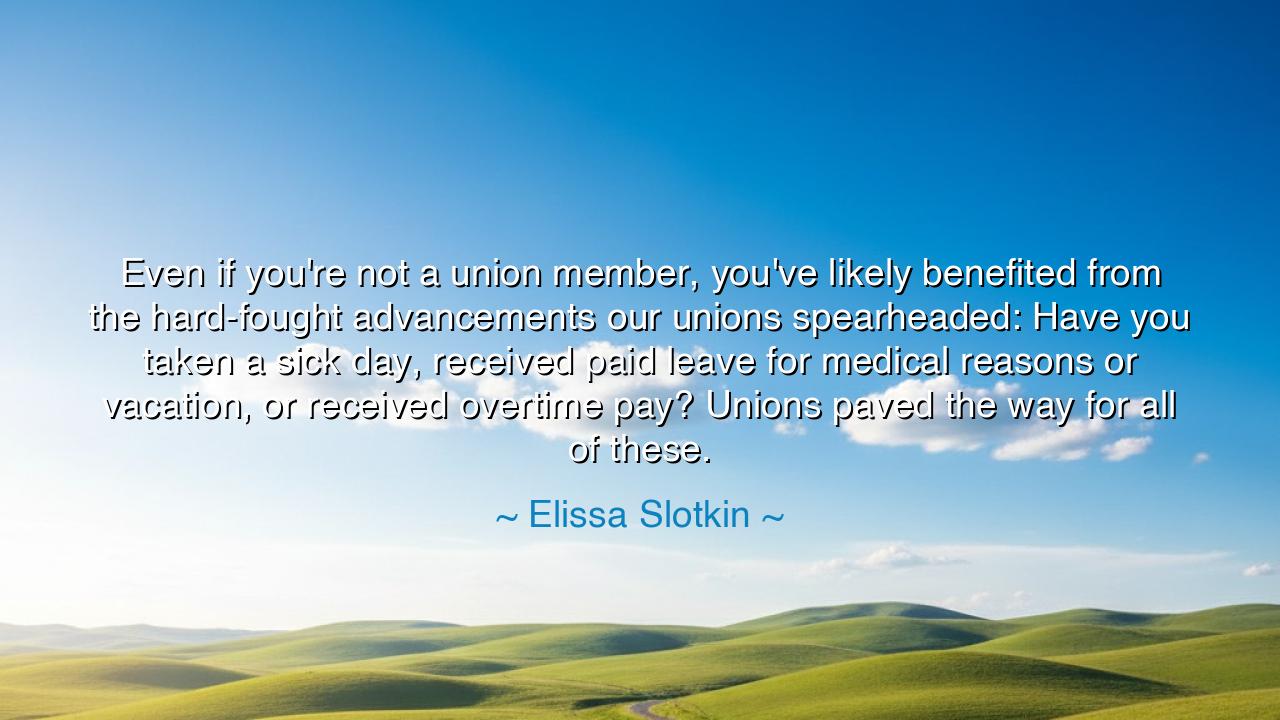
Even if you're not a union member, you've likely benefited from
Even if you're not a union member, you've likely benefited from the hard-fought advancements our unions spearheaded: Have you taken a sick day, received paid leave for medical reasons or vacation, or received overtime pay? Unions paved the way for all of these.






The words of Elissa Slotkin—“Even if you're not a union member, you've likely benefited from the hard-fought advancements our unions spearheaded: Have you taken a sick day, received paid leave for medical reasons or vacation, or received overtime pay? Unions paved the way for all of these.”—resound like a hymn to gratitude and remembrance. They remind us that the blessings we take for granted in our daily labor—the time to rest, the right to recover, the fair exchange of toil for dignity—were not gifts freely given, but victories wrested from struggle. Slotkin’s words are both reminder and rebuke: reminder of what has been won through unity, and rebuke to the forgetfulness that so often shadows prosperity.
At their heart, these words are a celebration of collective effort, a truth the ancients knew well. No temple was raised by a single mason, no city wall by one pair of hands. The ancients taught that labor, when joined with purpose, builds civilizations, while isolation weakens them. So too with unions—born not from privilege, but from necessity; forged in the fire of oppression, when the voices of workers were drowned by the roar of industry. To say that “unions paved the way” is to acknowledge that progress was not granted—it was earned, through sacrifice, courage, and solidarity.
The origin of this truth stretches deep into history. In the factories of the nineteenth century, men, women, and even children worked in misery—twelve, fourteen, sixteen hours a day, without safety, rest, or mercy. The first unions were born in secret, their members persecuted, imprisoned, even killed. Yet they endured, driven by the belief that no person should live as a cog in a machine. The strike, the picket, the protest—these became their instruments of justice. In time, their defiance yielded fruit: laws protecting the weak, wages that could sustain a family, and the recognition that work itself carries the dignity of the human spirit.
History offers us luminous examples. In 1936, at the Flint sit-down strike in Michigan, auto workers occupied the factories where they labored, refusing to leave until the company recognized their union. For forty-four winter days they endured cold, hunger, and threats of violence—but they prevailed. Their courage inspired thousands and reshaped American labor forever. From their sacrifice came the eight-hour day, the weekend, paid leave, and the right to collective bargaining. Each of these triumphs now flows quietly through our lives, invisible yet vital, like oxygen in the air. Slotkin’s words call us to remember that behind every sick day or overtime check, there stands a lineage of struggle, written in sweat and resolve.
Her statement is also a lesson in interconnectedness. She reminds us that even those who never joined a union, who perhaps never stood in protest or negotiation, still reap the benefits of those who did. The victories of labor movements, like ripples upon water, extend far beyond their source. A just law once written does not bless only its authors; it shelters all beneath its reach. In this, Slotkin echoes an ancient moral truth: that the labor of the few sustains the well-being of the many, and that to forget the laborer is to dishonor the very structure of society.
There is, too, a tone of warning in her words—a reminder that such gains, once taken for granted, can be lost. Rights unremembered grow fragile; gratitude unspoken turns to neglect. The ancients would have called this hubris: the arrogance of those who enjoy the fruit but forget the seed. Thus, Slotkin calls on each listener not only to acknowledge the past but to defend its legacy. For if the unity that built these rights fades, the forces of greed and apathy will erode them, as wind and water wear away even the strongest stone.
From her teaching emerges a timeless lesson for every generation: that justice is not self-sustaining, and that the comforts of the present are purchased by the courage of the past. The worker’s voice must never be silenced, and the spirit of solidarity must never grow cold. Let each person honor the unseen heroes who built the foundation of modern labor—those who dared to demand fairness when it was dangerous to do so. Let us act as they acted: with courage, with compassion, with conviction. For when we stand together in the cause of dignity, we stand in the oldest and noblest tradition of humankind—the tradition of those who believed that no one should rise while others are forced to crawl.
Thus, Elissa Slotkin’s words are not merely an observation but a sacred reminder: that the strength of a society lies in its memory, and its honor lies in how it treats those who labor. To remember the unions is to remember ourselves—to remember that our comfort was born of their courage, our rights from their resistance, our prosperity from their perseverance. And if we carry that remembrance with humility and gratitude, then we too may be counted among those who, in their time, paved the way for others yet to come.






AAdministratorAdministrator
Welcome, honored guests. Please leave a comment, we will respond soon